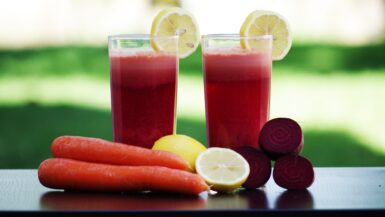Protein is an essential macronutrient that plays a crucial role in maintaining a healthy body. It is responsible for building and repairing tissues, producing enzymes and hormones, and supporting the immune system. A balanced diet that includes an adequate amount of protein is necessary for optimal health and well-being. In this article, we will explore the importance of protein in a healthy diet, how much protein we need, and the best sources of protein to include in our meals. We will also discuss some common myths and misconceptions about protein and provide practical tips for incorporating protein into our diets.
What is protein and why is it important for our body?
Protein is a macronutrient that is essential for the growth, repair, and maintenance of tissues in our body. It is made up of amino acids, which are the building blocks of protein. There are 20 different types of amino acids, and our body can produce some of them, while the rest must be obtained through our diet.
Protein plays a crucial role in many bodily functions, including the production of enzymes, hormones, and antibodies that help fight infections. It is also necessary for the transportation of nutrients and oxygen throughout our body.
Protein is particularly important for building and maintaining muscle mass. This is why it is often associated with bodybuilding and athletic performance. However, protein is also important for overall health and can help with weight loss by promoting feelings of fullness and reducing cravings.
In addition to its many functions, protein is also a source of energy, providing 4 calories per gram. However, it is not the preferred source of energy for our body, as carbohydrates and fats are more efficiently metabolized for this purpose.
Overall, protein is an essential nutrient that is required in adequate amounts for optimal health and function of our body. In the next section, we will discuss how much protein we need in our diet.
How much protein do we need in our diet?
The amount of protein a person needs in their diet depends on various factors, including their age, sex, weight, and activity level. The Recommended Dietary Allowance (RDA) for protein is 0.8 grams per kilogram of body weight per day for adults. This means that an average sedentary adult weighing 68 kilograms (150 pounds) needs about 55 grams of protein per day. However, this amount may vary depending on individual needs.
For example, athletes, pregnant and breastfeeding women, and older adults may need more protein to support their increased energy needs and maintain muscle mass. Studies suggest that athletes may require 1.2-1.7 grams of protein per kilogram of body weight per day, while pregnant and breastfeeding women may need an additional 25 grams of protein per day.
On the other hand, some people may need less protein in their diet, such as those with kidney disease, who may need to limit their protein intake to prevent further damage to their kidneys.
It is important to note that the quality of protein is also important. Animal-based sources of protein, such as meat, poultry, fish, eggs, and dairy, are considered high-quality proteins as they contain all the essential amino acids in the right proportions. Plant-based sources of protein, such as beans, lentils, nuts, and seeds, may be lower in some essential amino acids and may need to be combined with other plant-based sources to ensure adequate protein intake.
In summary, the amount of protein a person needs in their diet depends on their individual needs, and it is important to choose high-quality sources of protein to ensure optimal health and function of our body. In the next section, we will discuss the sources of protein and compare animal-based vs plant-based protein.
Sources of protein: animal vs plant-based protein
Protein can be obtained from both animal and plant-based sources. Animal-based sources of protein include meat, poultry, fish, eggs, and dairy products. Plant-based sources of protein include beans, lentils, nuts, seeds, and soy products.
Animal-based sources of protein are considered high-quality proteins as they contain all the essential amino acids in the right proportions. They are also rich in other important nutrients such as iron, vitamin B12, and zinc. However, some animal-based sources of protein, such as red and processed meats, are high in saturated fat and can increase the risk of heart disease and other health problems.
Plant-based sources of protein are generally lower in fat and calories and can provide other important nutrients such as fiber, vitamins, and minerals. However, they may be lower in some essential amino acids and may need to be combined with other plant-based sources to ensure adequate protein intake.
Research shows that both animal and plant-based sources of protein can be beneficial for health. However, consuming a diet high in animal-based protein has been associated with an increased risk of certain health conditions such as heart disease, cancer, and diabetes. On the other hand, a diet high in plant-based protein has been associated with a reduced risk of these conditions.
In summary, both animal and plant-based sources of protein can be part of a healthy diet. However, it is important to choose high-quality sources of protein and to consume a variety of protein sources to ensure adequate intake of all essential amino acids and other important nutrients. In the next section, we will discuss the benefits of consuming protein for weight loss and muscle gain.
The benefits of consuming protein for weight loss and muscle gain
Protein is often associated with weight loss and muscle gain, and for good reason. Consuming protein can increase feelings of fullness, reduce appetite, and help with weight loss. It can also help preserve muscle mass during weight loss, which is important for maintaining a healthy metabolism.
In addition to weight loss, consuming protein can also help with muscle gain. Protein is essential for building and repairing muscle tissue, making it an important nutrient for athletes and bodybuilders. Consuming protein after a workout can help with muscle recovery and growth.
Research suggests that consuming protein in combination with resistance exercise can increase muscle mass and strength. A review of 49 studies found that consuming more protein led to greater gains in muscle mass and strength in both young and older adults.
It is important to note that consuming excessive amounts of protein may not necessarily lead to greater muscle gains. Our body can only use a certain amount of protein for muscle synthesis, and any excess protein will be used for energy or stored as fat.
In summary, consuming protein can be beneficial for weight loss and muscle gain. It is important to consume an adequate amount of protein and to combine it with regular exercise to maximize the benefits. In the next section, we will discuss the risks of consuming too much protein.
The risks of consuming too much protein
While consuming protein is important for optimal health, consuming excessive amounts of protein may have negative effects on our health. In particular, consuming high amounts of animal-based protein, such as red and processed meats, has been associated with an increased risk of certain health conditions such as heart disease, cancer, and diabetes.
Consuming excessive amounts of protein may also put a strain on our kidneys, as they are responsible for filtering out the waste products of protein metabolism. People with kidney disease may need to limit their protein intake to prevent further damage to their kidneys.
In addition, consuming high amounts of protein may lead to dehydration, as our body needs more water to process and excrete the waste products of protein metabolism.
It is important to note that consuming moderate amounts of protein is generally considered safe for most people. The RDA for protein is set at a level that is sufficient to meet the needs of most healthy adults. However, it is important to choose high-quality sources of protein and to consume a variety of protein sources to ensure adequate intake of all essential amino acids and other important nutrients.
In summary, consuming excessive amounts of protein, particularly from animal-based sources, may have negative effects on our health. It is important to consume moderate amounts of protein and to choose high-quality sources of protein to ensure optimal health and function of our body. In the next section, we will discuss the symptoms and prevention of protein deficiency.
Protein deficiency: symptoms and how to prevent it
Protein deficiency is a condition that occurs when a person does not consume enough protein in their diet. It is more common in developing countries where people may not have access to adequate sources of protein. In developed countries, protein deficiency is rare, but it can occur in certain groups of people, such as the elderly, people with eating disorders, and people with certain medical conditions.
Symptoms of protein deficiency may include muscle wasting, weakness, fatigue, and a weakened immune system. In children, protein deficiency can lead to stunted growth and developmental delays.
To prevent protein deficiency, it is important to consume an adequate amount of protein in your diet. The RDA for protein is 0.8 grams per kilogram of body weight per day for adults. Good sources of protein include meat, poultry, fish, eggs, dairy, beans, lentils, nuts, and seeds.
It is also important to choose high-quality sources of protein, as some sources may be lower in certain essential amino acids. Combining different sources of plant-based protein can help ensure adequate intake of all essential amino acids.
For people with certain medical conditions, such as kidney disease, it may be necessary to limit protein intake. However, this should be done under the guidance of a healthcare professional.
In summary, protein deficiency is rare in developed countries, but it can occur in certain groups of people. To prevent protein deficiency, it is important to consume an adequate amount of protein from a variety of sources. In the next section, we will discuss the best time to consume protein for optimal health.
The best time to consume protein for optimal health
While consuming an adequate amount of protein is important for overall health, the timing of protein consumption may also play a role in optimizing its benefits. Consuming protein at certain times may help with muscle recovery and growth, weight loss, and overall health.
Research suggests that consuming protein after a workout can help with muscle recovery and growth. Consuming protein before bed may also be beneficial for muscle recovery and growth during sleep.
Consuming protein with meals can also help with weight loss and weight management. Protein is more satiating than carbohydrates or fats, meaning it can help reduce appetite and increase feelings of fullness, which can lead to consuming fewer calories overall.
In addition, spreading protein intake throughout the day may be more beneficial than consuming most of it in one meal. Consuming protein at each meal can help with muscle maintenance and growth, as well as reducing appetite and promoting weight loss.
It is important to note that consuming excessive amounts of protein at any time may have negative effects on our health, as discussed earlier. Consuming moderate amounts of protein at regular intervals throughout the day is generally considered safe and beneficial for overall health.
In summary, consuming protein at certain times may help optimize its benefits for muscle recovery and growth, weight loss, and overall health. Spreading protein intake throughout the day and consuming moderate amounts of protein at regular intervals is generally considered safe and beneficial. In the next section, we will discuss protein supplements and whether they are necessary.
Protein supplements: are they necessary?
Protein supplements are a popular choice for many people who want to increase their protein intake. These supplements come in various forms, such as protein powders, bars, and shakes. While protein supplements can be convenient, they are not always necessary.
If you are already consuming enough protein from your regular diet, then protein supplements may not be necessary. However, if you are an athlete or someone who is trying to build muscle mass, protein supplements can be a helpful addition to your diet.
Protein supplements can also be useful for people who have dietary restrictions or allergies that make it difficult to consume enough protein from food sources alone. For example, vegans and vegetarians may find it challenging to get enough protein from plant-based sources, and protein supplements can help fill this gap.
It’s important to note that not all protein supplements are created equal. Some supplements may contain added sugars or other ingredients that are not beneficial for your health. It’s essential to read the labels carefully and choose a high-quality supplement that fits your dietary needs.
Overall, protein supplements are not necessary for everyone, but they can be a helpful addition to your diet if you need to increase your protein intake. It’s important to choose a high-quality supplement and consume it in moderation as part of a balanced diet.
How to incorporate protein into your diet with healthy meal ideas
Incorporating protein into your diet is essential for optimal health, but it can be challenging to know how to do this while maintaining a balanced diet. Fortunately, there are many healthy meal ideas that are rich in protein and easy to prepare.
Breakfast
For breakfast, you can try a protein-rich smoothie made with Greek yogurt, frozen berries, and almond milk. You can also make a veggie omelet with spinach, mushrooms, and feta cheese or scrambled eggs with avocado and whole-grain toast.
Lunch
A protein-packed lunch can include a turkey or chicken sandwich on whole-grain bread with avocado and vegetables. You can also make a quinoa salad with grilled chicken, chopped vegetables, and a vinaigrette dressing or a lentil soup with a side of whole-grain crackers.
Dinner
For dinner, grilled fish or chicken with roasted vegetables and brown rice is a great option. You can also make a tofu stir-fry with mixed vegetables and brown rice or a chickpea curry with whole-grain naan bread.
Snacks
Healthy protein-rich snacks include Greek yogurt with berries, a handful of nuts, or hummus with vegetables. You can also make protein bars or energy balls with nuts, seeds, and dried fruit.
When incorporating protein into your diet, it’s important to choose lean protein sources such as chicken, fish, tofu, and legumes. You should also aim to have a variety of protein sources in your diet, including both animal and plant-based sources.
By incorporating protein into your meals and snacks, you can maintain a healthy and balanced diet that supports your overall health and wellness.





Leave a reply